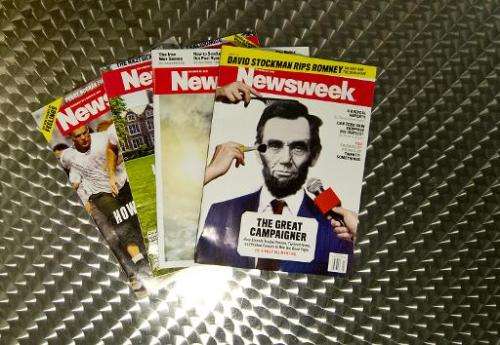This October 18, 2012 photo illustration shows copies of Newsweek magazine in Washington, DC
Newsweek magazine would face enormous hurdles with its plan to revive its print edition ended just last year. Yet some analysts say it has a chance to succeed.
The resuscitation of the weekly edition would counter the trend in an industry that has been hammered by a shift to digital and declining print readership and advertising.
"The plan doesn't seem to take into account the brand equity the title has lost in the past 10 to 15 years," said Rebecca Lieb, analyst at the Altimeter Group who follows digital marketing and advertising.
Lieb said Newsweek, which ended its print edition last December after a series of ownership changes, has drastically cut its news staff and coverage, and as a result would have a hard time competing with rivals such as The Economist.
Newsweek's parent company IBT Media's co-founder and chief executive Etienne Uzac told AFP the company plans to restart the print edition of Newsweek in 2014, joining the international print editions which are still published.
"This is an extension of what we are already producing with an e-magazine," Uzac said. "We will continue what we have in a paper format instead of only on a tablet computer."
Uzac said recently hired editor-in-chief Jim Impoco "has put in place and will continue to put in place a strong team. We will do investigative reporting. We will go into depth in some fields."
The New York-based company expects a circulation of around 100,000 including subscription and newsstand sales, according to the French-born Uzac.
Newsweek currently has a staff of about 20, with some assistance from the parent company and freelancers, and will be adding to its editorial team, he added.
Impoco told the New York Times he believes the print edition would be "a premium product, a boutique product," which could pay for itself with subscription fees. Pricing has not been determined, an IBT spokesperson said.
But Lieb said: "That's not how you create a premium, boutique product. First you have to have a premium product, and they don't have it."
Ken Paulson, former editor in chief of USA Today who is now dean of mass communication at Middle Tennessee State University, said Newsweek has a chance in print because of its proud history.
"Newsweek still means something to people, and they have a shot at succeeding," Paulson told AFP.
"But everybody's expectations have to be dialed down. This is not going to be the Newsweek of old. It will have a smaller circulation, a narrower audience."
Paulson said print remains an important medium for news, and that readers may rethink print publications in view of the increasing number of paywalls for digital news.
"I point to the inherent advantages of print," he said. "It's virus-free, there are no pop-up ads, its portable, and requires no batteries. Print is still an extraordinarily convenient and hassle-free way to get your information, so there will be a market for print for a long time."
And Paulson maintained that despite declining readership for news magazines, "there will be a market for sophisticated reporting on complex topics."
The return of Newsweek's print edition would cap a turbulent few years for the title, which was first published in 1933. At the start of the 1990s, the magazine had a worldwide circulation of 3.3 million readers, but sales declined steadily over the next two decades, slipping to 1.5 million by 2010.
The magazine was sold in 2010 to the billionaire investor Sidney Harman, who merged it with The Daily Beast website.
The magazine continued in an online-only format called Newsweek Global, and was bought by digital media company IBT Media in August.
Alan Mutter, a former editor at the Chicago Sun-Times who is now a consultant on digital media, said the Newsweek plan to revive its print edition "faces all the problems of a start-up combined with all of the headwinds that are arrayed against print."
"To succeed, Newsweek faces an uphill battle on all fronts, with the unfortunate baggage of years of deteriorating quality, years of deteriorating visibility and, accordingly, years of deteriorating consequence," Mutter told AFP.
"Having said all that, wouldn't it be great if they pulled it off?"
© 2013 AFP























